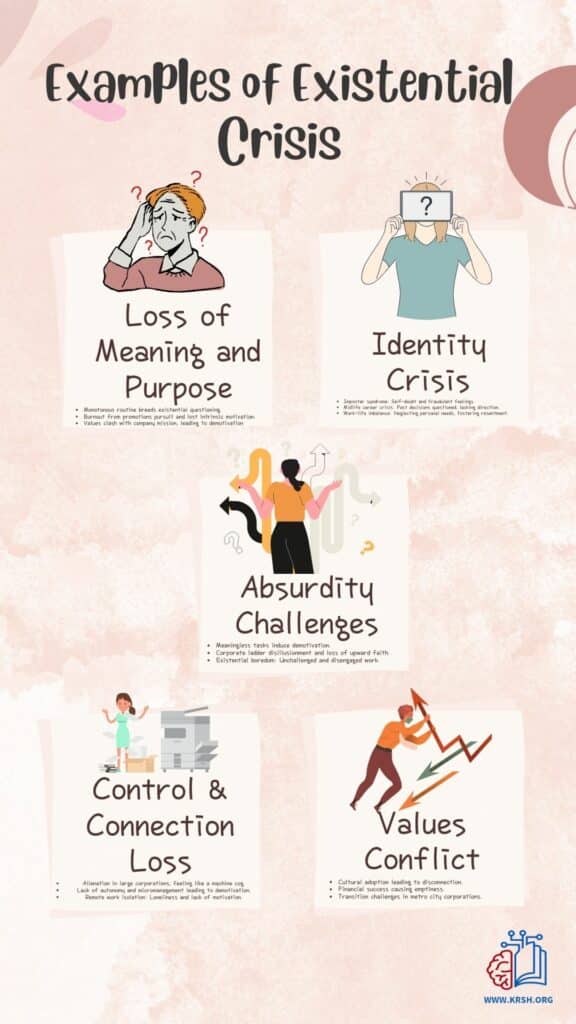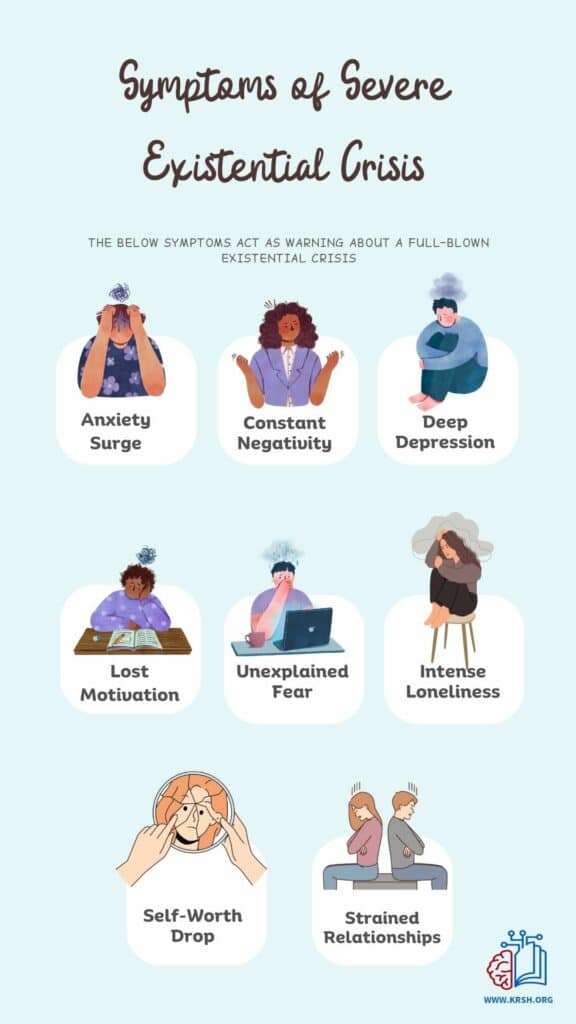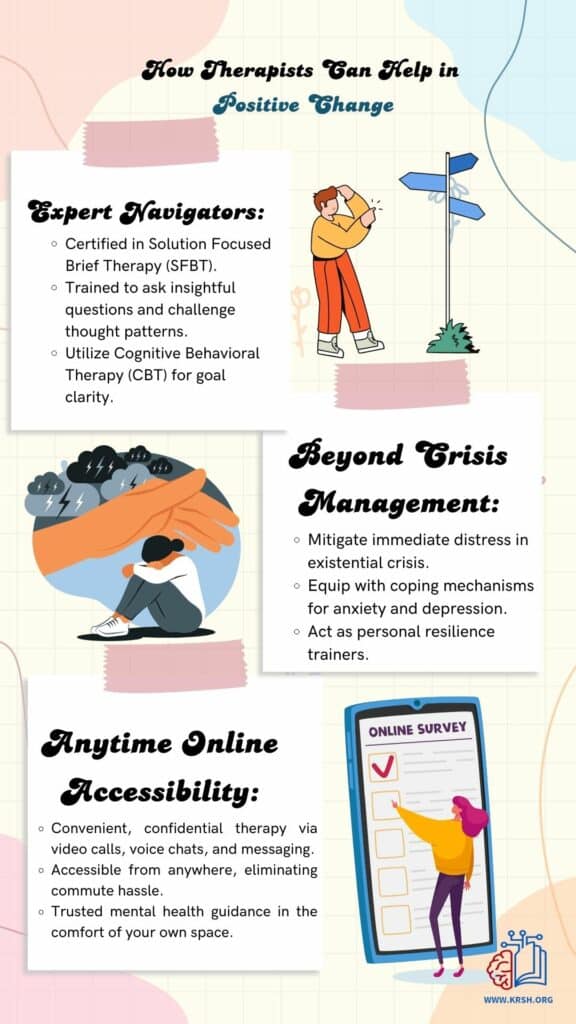Stuck in a cubicle, staring at a spreadsheet that feels more like a tombstone? Feeling like you’re climbing the corporate ladder, only to find it leaning against the wrong wall? Don’t despair. Feelings of existential crisis might be the very spark you need to transform your life for a bigger goal.
However, there may be severe symptoms of existential crisis which comes from loss of a loved one or catastrophic change in life. These symptoms include physiological distress and mental health concerns.
Correct diagnosis and guidance can help you to bring positive changes more easily and sooner in your life.
Examples of Existential Crisis

Loss of Meaning and Purpose
- The “hamster wheel” feeling: An employee feels stuck in a monotonous routine, questioning the significance of their daily tasks and career path.
- Burnout from chasing extrinsic rewards: A high-achiever constantly chasing promotions and bonuses loses sight of intrinsic motivation, leading to burnout and questioning the point of it all.
- Dissatisfaction with company mission: An employee’s values clash with the company’s priorities, leading to a disconnect and demotivation in contributing to something they don’t believe in.
Identity Crisis
- Imposter syndrome: An employee constantly doubts their skills and accomplishments, feeling like a fraud and struggling to feel confident in their work.
- Midlife career crisis: A questioning of career choices and past decisions, leading to indecision and lack of direction in their professional path.
- Struggle with work-life balance: Feeling consumed by work, neglecting personal needs and passions, leading to resentment and a disconnect from work’s purpose.
Facing Absurdity
- Meaningless tasks and bureaucracy: Performing repetitive, pointless tasks creates a sense of futility and demotivation, questioning the value of their contribution.
- Corporate ladder disillusionment: Seeing the cutthroat nature of corporate competition and power dynamics, losing faith in upward mobility and questioning the value of climbing the ladder.
- Existential boredom: Feeling unchallenged and intellectually stifled in their work, leading to apathy and disengagement.
Loss of Control and Connection
- Alienation in a large corporation: Feeling like a cog in a machine, lacking personal connection and purpose within a faceless organization.
- Lack of autonomy and micromanagement: Feeling controlled and unappreciated, leading to demotivation and resentment towards work.
- Lack of social connection and purpose: Working remotely or in isolated environments can lead to loneliness and lack of motivation in contributing to a shared goal.
- Existential crises can manifest in various ways, triggered by different life events and internal struggles.
Conflict of Values
- An Indian professional working abroad adopts aspects of the host culture while feeling disconnected from their own roots, leading to a sense of confusion and displacement. ( “The Namesake” by Jhumpa Lahiri)
- An Indian professional achieving financial success might grapple with emptiness and a lack of deeper meaning in their materialistic pursuits. (“The White Tiger” by Aravind Adiga)
- An employee who makes the transition from town to a metro city corporation grapples with the politics at office and the feeling of being disconnected from values.
How Existential Crisis Can Transform Your Life
Stuck in a cubicle, staring at a spreadsheet that feels more like a tombstone? Feeling like you’re climbing the corporate ladder, only to find it leaning against the wrong wall? Don’t despair, feelings of existential crisis might be the very spark you need to transform your life for a bigger goal.
Reframe the Narrative
Shift your perspective from passive rumination on “meaninglessness” to proactive cultivation of “meaningfulness.” Engage in activities that ignite your passion, be it joining a professional association, volunteering for a cause you believe in, or exploring spiritual avenues. Actively constructing a life infused with purpose can dispel feelings of futility.
Journal for Clarity
Unburden your mind by journaling your anxieties and worries. Then, engage in a cognitive reframing exercise. Alongside each negative entry, create a corresponding “positives” list – people, places, achievements – that showcase your strengths and the inherent value woven into your life. This simple practice can shift your mindset from deficit to abundance.
Question the “Status Quo”
Ever heard of a “chalta hai” (“whatever, it works”) attitude? While it can get you through the day, it’s a creativity killer in the long run. An existential crisis throws a wrench in that “chalta hai” machine, forcing you to question everything – your role, your team, your company and even the whole society. This healthy skepticism can be a powerful tool. Use it to identify inefficiencies, bring improvements, and become the changemaker your office needs (and secretly craves).
Empower the Phoenix Within
Remember the mythical phoenix rising from ashes? Existential crises can feel like burnouts, leaving you feeling like a pile of smoldering papers. Manage time to re-evaluate your skills, learn new ones, and reinvent yourself. Take that online course, attend that workshop, network with those inspiring folks in other departments. You’ll emerge stronger, sharper, and ready to fly beyond the cubicle walls.
Find Your Masti in the Mayhem
Let’s face it, corporate life can be, well, corporate. But even in the midst of deadlines and dress codes, there’s always room for “masti” (“fun”). An existential crisis can help you rediscover that joy. Look for the humor in the mundane, celebrate small victories with your colleagues (chai pe charcha, anyone?), and inject some creativity into your work. Remember, a happy employee is a productive employee (and a much more pleasant one to be around!).
Mix Your Strengths and Passions
Often, our dream careers seem like distant galaxies, far from the corporate grind. But what if you could bridge the gap? An existential crisis can help you see the connections you never noticed before. Maybe your love for writing can be channeled into crafting killer marketing campaigns. Or your passion for music can inspire innovative team-building exercises. A humble Kichdi is one of the most nutritious dishes, prepared with mixing grains and vegetables. By mixing your strengths and passions – you might create a career dish that’s both delicious and fulfilling.
Deconstruct the Overwhelming
Feeling paralyzed by existential inquiries like “what is my purpose?” can be debilitating. Instead, consider deconstructing these macro-questions into manageable micro-quests. Ask yourself, “What small action can I take today to bring more fulfillment to my life?” or “How can I approach a personal fear with greater acceptance and resilience?” Smaller, achievable goals pave the path towards long-term purpose.
Satisfy Intellectual Inquiries
Existential questions have been pondered by philosophers and theologians for centuries. Don’t hesitate to leverage their wisdom! Actively engage in research – read philosophical texts, watch documentaries, attend lectures – to glean insights and perspectives from those who have grappled with similar anxieties.
Build Your Support Network
Existential anxieties can feel isolating, but human connection is a powerful antidote. Cultivate and rely on your support system. Openly converse with mentors, share your thoughts and feelings, and seek their wisdom and counsel. Remember, a strong social fabric can provide invaluable solace and perspective during turbulent times.
So, welcome your existential crisis with a cup of chai, and have a conversation. It might just be the wake-up call to transform your life.
Symptoms of a Severe Existential Crisis
Pondering about the meaning and purpose of life can be a catalyst for growth. However, the below symptoms act as warning about a full-blown existential crisis.

- Elevated Anxiety: Frequent panic attacks, heightened nervousness, and a general sense of unease often accompany existential dread. It’s like living on a constant mental tightrope.
- Pervasive Negativity: Chronic irritability, skepticism, and a loss of interest in previously enjoyable activities can signal a deeper internal conflict. Think of it as your inner sunshine being eclipsed by existential clouds.
- Depression’s Grip: Feelings of sadness, hopelessness, and worthlessness are commonly linked to existential crisis. It’s like carrying a heavy weight of uncertainty on your shoulders.
- Unexplained Fear: An unsettling sense of foreboding regarding the future or the unknown can be a symptom of existential angst. Fear becomes an unwelcome passenger in your mind.
- Profound Loneliness: Feeling isolated and disconnected from others is a frequent byproduct of existential questioning. It’s like drifting alone in a vast, empty ocean.
- Motivation Malaise: Apathy towards work, personal goals, and even basic self-care can signal a loss of direction and purpose. Imagine the sails of your life ship deflated by existential winds.
- Dented Self-Esteem: Feeling worthless and insignificant are hallmark signs of an existential crisis. It’s like your self-worth meter plummeting to zero.
- Relationship Strains: Constant conflict, a sense of disconnection, and questioning the value of relationships can be manifestations of existential anxieties. Communication becomes a bridge crumbling under the weight of doubt.
Beyond the Surface: The Seven Existential Pillars
- Death Anxiety: Contemplating mortality and the hereafter can trigger significant existential distress. It’s like peering into the abyss of the unknown.
- Loss and Change: Experiencing personal loss or major life transitions can prompt questions about identity and purpose. Imagine standing on shifting sands unsure of where to build your foundation.
- Depression’s Shadow: Existential crisis and depression often intertwine, creating a complex web of emotional turmoil. It’s like being trapped in a dark labyrinth with no clear exit.
- Anxiety’s Foothold: Existential worries can fuel constant anxiety, leading to a perpetual state of unease and anticipation. It’s like living in a world amplified by worry.
- Isolation’s Echo Chamber: Withdrawing from social connections due to existential angst can exacerbate feelings of loneliness and isolation. It’s like building walls around yourself, shutting out the potential for support.
- Directionless Drift: Feeling lost and unsure of your path in life is a common theme in existential crisis. Imagine being adrift at sea without a compass or destination.
- Freedom’s Paradox: The paradox of choice, where both the abundance and lack of it can trigger existential anxieties, can be a source of distress. It’s like being overwhelmed by the vastness of possibilities.
Remember: These are just some pointers, and an existential crisis can manifest in different ways for different people. If you’re feeling overwhelmed by these symptoms, reach out for help to a therapist at Krsh Welfare Foundation.
How Therapists Can Help in Positive Change
Correct diagnosis and guidance can help you to bring the change more easily and sooner.

Expert Navigators
All therapists at Krsh Welfare Foundation are certified in Solution Focused Brief Therapy (SFBT). They are trained at asking pointed questions that encourage introspection and challenge ingrained thought patterns. Therapists may also use techniques of Cognitive Behavioral Therapy (CBT) to achieve clarity of goals. Think of them as skilled cartographers, helping you chart a course through the tangled wilderness of your existential anxieties.
Beyond Crisis Management
While a therapist’s expertise can undoubtedly mitigate the immediate distress of an existential crisis, their value extends far beyond crisis management. They can equip you with valuable coping mechanisms to manage anxiety, depression, and intrusive thoughts that often accompany existential angst. The play the role of personal resilience trainers.
Anytime Online Accessibility
Busy schedules and geographical limitations are not a barrier to accessing support at Krsh Welfare Foundation. As an NGO, we offer convenient and confidential therapy sessions through video calls, voice chats, and secure messaging. Imagine having a trusted mental health guide readily available in the comfort of your own space, eliminating the need for inconvenient commutes or crowded waiting rooms.
Remember: Seeking professional help is not a sign of weakness, but rather a proactive step towards personal empowerment. Therapists do not dictate solutions but collaboratively guide you towards discovering your own inner strength and resilience. They are partners in transformation, helping you emerge from the throes of your existential crisis with a renewed sense of purpose and direction.